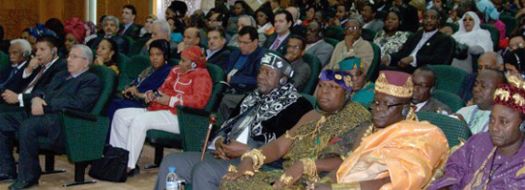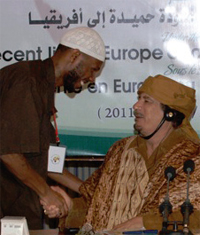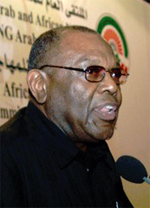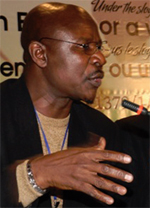-Staff Writer-
- Related story:
Farrakhan advises Obama on Libya policy, proper guidance for America (FCN, 03-15-2011)

TRIPOLI, Libya (FinalCall.com) – Each year thousands of Africans faced with poverty and or confl ict are lured by dreams of a better life to leave their homeland for Europe.
Increasingly they are met with racism, more poverty and often death when poorly made boats sink.
The leader of Libya, Muammar Gadhafi , was moved by their plight and organized a conference, January 15-17, to address migrant needs and concerns. More than 500 delegates and speakers came from around the world to attend the conference organized under the theme, “A Decent Life in Europe or a Welcome Return to Africa.”
“We should live in Europe with decency and dignity,” he told the attendees in a private session. “We need a good relationship with Europe not a relationship of master and slave. There should be strong relationship between Africa and Europe. Our presence should be strong, tangible and good. It’s up to you as the Africans in the Diaspora. We have to continue more and more until the unity of Africa is achieved.”

“From now on, by the will of God, I will assign teams to search, investigate and pass on to the Africans in Europe and to check their situations,” said Mr. Gadhafi . “This is my duty and role towards the sons of Africa; I am a soldier for Africa. I am here for you and I work for you; therefore, I will not leave you and I will follow up your conditions.”
The conference organized regional teams to examine the situation of migrants, identify their problems and form permanent committees to address them, conduct a census to organize migrants according to jobs, countries of origin and countries of current residence.
Joint committees of African migrants, the United Nations, the African Union, the European Union and international organizations also discussed the need to coordinate implementation of conference recommendations.
Speaker after speaker at the conference detailed the trials of life in Europe. One of the problems Africans face when migrating is cultural imperialism, explained by Nation of Islam International Representative Akbar Muhammad, during remarks in an opening session.

“It robs you of what your roots are. I’ve asked many people here where they are from. I’ve heard ‘I’m from Paris’; ‘I’m from Germany.’ But that’s not where you’re really from. You must hold on to your African identity and reject the cultural imperialism that forces you to change your name. Make sure your African identity is always first. You are from Togo living in Paris or Germany.”
“This conference is for those who fi ll the jails in Europe and those who died on the way to Europe. Look at how the Greeks are building fences to keep you out, look at the stiff criminal sentences Africans get in Europe, and look at how the Swiss have voted against minarets,” he added.
Mr. Muhammad reminded the audience that the conference was opening on the 82nd birthday of U.S. civil rights leader Dr. Martin Luther King. He spoke of Dr. King’s 1957 speech after his visit to Africa.
“Dr. King’s visit to Africa and his message afterwards are never spoken of in America. If you ask Americans when did Dr. King go to Africa and what did he say they couldn’t answer. Here are his words to Black people, ‘We must migrate to Africa and build this great continent.’ ”
Dr. Muhammad Beshari, secretary general of the European Islamic Conference, said no one is addressing the needs of African migrants. “Even human rights activists are only dealing with the rights of the White man,” he declared.
“The tensions between the two shores of the Mediterranean (Europe and Africa) must stop. Misconceptions and misunderstandings lead to sects and groups, wars, clashes and fatwahs. How can we root out the causes of hatred?” he asked.
The problems between Africa and Europe started hundreds of years ago.

“The colonials displaced millions of Africans to North America and Latin America. This was one of the worst eras that Africa is still suffering from today. Then came colonialism, another worse period. The country’s resources were spoiled by an attempt to reshape culture, language and civilization. There was military and cultural colonialism,” argued Dr. Ahmed Ibrahim, secretary general of Libyan Affairs.
“Even when colonialism left economically the hold still remains. We have companies that use and exploit African resources. The lack of economic opportunities pushes people to migrate. There is a brain drain. They migrate to the U.S. for study, they work in the U.K. or the U.S. but they never come back. Therefore their countries never benefi t from their knowledge.”
Africa’s brain drain
“The Black continent’s problems of one sort or another ‘drain’ started fi ve centuries ago, in the form of ‘human drain.’ African young were hunted down, shipped like cattle, and sold in the New World as slaves. This was followed by ‘wealth drain.’ Africa, the richest continent on the planet, has been robbed of its natural resources ever since,” said Palestinian writer Ali Baghdadi.
“In the last 60 years, Africa, including the Arab World, has been subjected to a new form of drain, ‘brain drain,’ which should not be confused with ‘brain exchange,’ a natural and healthy phenomena which stems from interaction between cultures and civilizations throughout history,” he told conference goers.
This brain drain is depleting Africa and the Arab world’s intellectual wealth. The number of African immigrants in the United States grew 40-fold between 1960 and 2007, from 35,355 to 1.4 million. Most of this growth has taken place since 1990.
“Compared to other immigrants, the African born tend to be highly educated and speak English well. However, they are also more likely not to be naturalized U.S. citizens than other immigrants,” observed Misbahudeen Ahmed Rufai, a professor at Malcolm X College in Chicago.
“The top individual countries of origin of the African-born are Nigeria, Egypt, and Ethiopia. In the United States, Africans are concentrated in New York, California, Texas, Maryland, and Virginia,” he added.
According to Dr. Rufai, more than 75 percent of foreign born Africans in the United States have arrived since 1990. As of 2007, 44.0 percent of the 1.4 million African foreign born entered the country in 2000 or later, and 32.4 percent entered between 1990 and 1999. An additional 13.7 percent entered between 1980 and 1989, 6.9 percent between 1970 and 1979, and the remaining 3.0 percent prior to 1970. “Africa is being emptied of its best, brightest, most well-educated, and highly talented. Great scholars in modern sciences, electronics, engineering, arts and management, and highly experienced researchers and professionals, and innovators, are lured to Western countries for more promising living conditions and self development, leaving behind the unpaid bill for their education and abandoning an educational system depleted of its great and urgently needed talents,” said Mr. Baghdadi.
“Ironically, Africa exports its college graduates and professionals to aging Europe and North America, which actively seeks them to improve their international competiveness against the new economic giants; and thus makes rich nations richer and more developed. It is an alarming problem, which doesn’t have a quick or easy solution.”
How does this intellectual loss translate into dollars and cents?
“In 1996, as one example, 25 percent of college graduates left Africa the year of their graduation for higher studies abroad. Half of them never returned. Between 1998 and 2000, 15,000 Arab doctors emigrated. Taking into account the cost of education and preparation of a doctor, a scientist or an academic, according to the 2006 report of the Organization of Arab Labor, the brain drain costs the Arab world alone approximately $200 billion a year,” said Mr. Baghdadi.
“Egypt’s losses are estimated to be $54 billion annually. It is interesting to note that the lost and wasted wealth would have paid the entire Egyptian national debt of $41 billion in 1990.”
According to Mr. Baghdadi, the number of professionals who left for the United States alone surpasses what is left in the entire Black continent. One third of Africa’s top scientists migrated to the West. According to the U.N. Economic Development for Africa, as well as African Capacity Building Foundation, Africa has been losing 20,000 professionals each year since 1990.
If this trend continues, Africa will be drained of the brains it urgently needs to develop. Consequently, Africa spends $4 billion a year on foreign professionals for services needed to compensate for its losses. In the 1960s, Egypt was ahead of China, India and Turkey in terms of growth and development, at present “human brain” marketing has become its number one export commodity.
Statistics indicate that there are more than 844,000 Egyptian professionals abroad; 450,000 are considered scientifi c geniuses in all fi elds of scientifi c research. Over 21,000 Nigerian doctors practice in the U.S. alone. In Ghana, one in every two of the skilled professionals chooses to leave. Half of educated Angolans live abroad and the African nation has lost 60 percent of its physicians.
The serious exodus of African health professionals hinders the war against malaria, HIV/AIDS and other deadly diseases.
A decent life in Europe?
From afar Europe appears to be a dream for Africans looking to escape poverty, government instability and fi nd a better life– but for every dream that comes true there are countless nightmares.
Joseph Bunta left the Democratic Republic of Congo as a teenager trying to escape the political strife. He went to the Ukraine where many Congolese have gone to study at the University of Patrice Lumumba.
“One day without provocation a group of White boys just attacked him with knives. They surrounded him, stabbed him and ran. They were suspected skinheads according to the police but no one was interrogated,” said Charles Asante Yeboa, who held up Joseph’s picture during the conference.
“He just went to buy some water and he didn’t come back.”
Mr. Yeboa spoke on the needs and concerns of Africans living in the Ukraine. “We come here to study. The
problem is we don’t have a lot of information about the country before we come. What we do have is misinformation. We think we can study and work at the same time but we can’t,” he told The Final Call.
“The Ukrainians think the Africans are the source of their economic problems. They have no serious interactions with us. We are just problems to them. There is no diversity in anything. They need to understand that we are humans too.
I am speaking for the Africans in Ukraine.”
Things are not much better in the United Kingdom.
“We are torn between two cultures, African and European. It is really hard on the children. They are neither African nor European. They have no culture to be proud of. When minor refugees come they are fostered with White families and the social integration begins,” said Rahma Abdalla, a Somalia living in London.
“The teenagers form gangs and commit crime to release their anger. They are in the middle of nowhere mentally but still see this as better than living in a war zone. There are small numbers of Africans in the political process to help us. Those that are there will be more White than African. He will have lost all contact with Africa.”
The conference brought together professionals in the best position to address these problems and connect Africans.
“We need help to impact the people. We need education ourselves. We need to understand unity; too many have forgotten about Africa,” said Mr. Yeboa.












